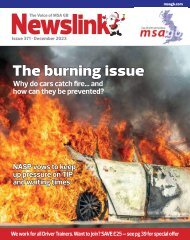Newslink January 2022
Motor Schools Association of Great Britain, driving instructors, ADIs, driver training and testing, road safety
Motor Schools Association of Great Britain, driving instructors, ADIs, driver training and testing, road safety
Create successful ePaper yourself
Turn your PDF publications into a flip-book with our unique Google optimized e-Paper software.
For all the latest news, see www.msagb.com<br />
Get your pupils ‘cycle savvy’<br />
Are your learner drivers ‘cycle savvy’?<br />
Whatever mode of transport we<br />
choose, we all share the road with<br />
others, including vulnerable road users,<br />
so the Department for Transport wants<br />
ADIs to build cycle awareness skills into<br />
learners as part of their lessons.<br />
A new ‘Cycle Savvy Driving’ course<br />
has been launched by the DfT to help<br />
you and your pupils develop<br />
understanding and co-operation<br />
between drivers and cyclists.<br />
It’s free, takes just two hours and you<br />
can access it either online or opt for a<br />
practical training session.<br />
£100 Amazon vouchers can be won<br />
by participants.<br />
Read more about Cycle Savvy Driving<br />
and register today at<br />
https://www.cyclesavvydriving.co.uk<br />
Congestion not caused by cycle lanes<br />
Cyclists have criticised claims that bike<br />
lanes are responsible for increased levels<br />
of congestion in London.<br />
The average driver in London spent<br />
148 hours in traffic jams in 2021<br />
– twice the national average – and<br />
anti-cycle lane groups claimed that this<br />
had been caused by an increase in cycle<br />
lanes. However, cyclists pointed out that<br />
congestion during 2021 was the same<br />
as in 2019, before the pandemic.<br />
They said: “Cycle lanes do – obviously<br />
– reduce the amount of space available<br />
for cars but evidence from other cities<br />
highlights that offering alternative ways<br />
to move around cities cuts traffic levels<br />
eventually. The goal of cycle lanes is to<br />
reduce the share of trips by car. This is<br />
what has happened in London after a<br />
major investment in public transport,<br />
which rose from 27 per cent of all<br />
journeys in 2000 to 36 per cent in<br />
2019, while private transport use fell<br />
from 48 per cent to 37 per cent.<br />
Investing in cycle lanes is crucial if we<br />
are reduce our reliance on private cars.”<br />
Coventry scrappage<br />
scheme takes diesels<br />
off the city’s roads<br />
A revolutionary scrappage scheme in<br />
Coventry has recruited 71<br />
participants who, in exchange for<br />
mobility credits worth £3,000, have<br />
agreed to let their old polluting cars<br />
be crushed. More than half of<br />
participants are scrapping diesel cars.<br />
The money can only be spent on<br />
alternative travel arrangements such<br />
as public transport, taxis, hire cars or<br />
car club services.<br />
The trial is part of the West<br />
Midlands Future Transport Zone, a<br />
£22m programme that aims to<br />
investigate how new technologies can<br />
be used to support people moving<br />
around the region in a more<br />
sustainable way – reducing<br />
congestion, improving air quality and<br />
tackling climate change.<br />
Government officials are said to be<br />
monitoring the success of the<br />
Coventry scheme closely with a view<br />
to rolling-out a similar programme<br />
nationwide.<br />
NEWSLINK n JANUARY <strong>2022</strong><br />
15

















